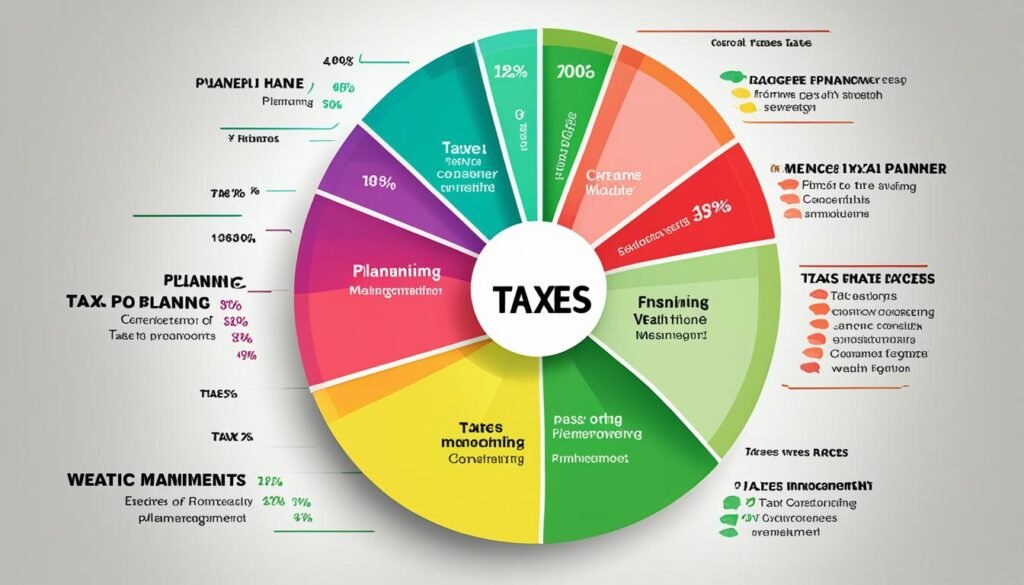Finance planner is the process of developing strategies and setting financial goals to manage one’s money and assets effectively, often with the goal to achieve financial security and meet specific future financial obligations, such as retirement, education costs, or home ownership. It can include budgeting, investing, tax planning, insurance and risk management, retirement planning, and estate planning. The role of financial planning remains pivotal, serving as a compass directing to viable paths and resources needed for achieving monetary targets and facilitating the wise use of economic resources.
One of the prime objectives of financial planning is to assist individuals and organizations in meeting their financial objectives, providing a roadmap to realize these goals. Financial planning also plays a critical role in creating and sustaining wealth, promoting disciplined investment and guiding on diversified investment to fend off market volatilities, ensuring a consistent growth in wealth. It also acts as a protective shield against economic uncertainities, safeguarding financial interest and paving way for steady economic growth.
Key Takeaways
- Financial planning is the process of developing strategies and setting financial goals to manage money and assets effectively.
- Financial planning includes budgeting, investing, tax planning, insurance and risk management, retirement planning, and estate planning.
- The role of financial planning is to assist individuals and organizations in meeting their financial objectives and provide a roadmap to achieve their goals.
- Financial planning plays a critical role in creating and sustaining wealth, promoting disciplined investment, and guarding against market volatility.
- Financial planning acts as a protective shield against economic uncertainties, safeguarding financial interests and promoting steady economic growth.
Understanding Financial Planning
Financial planning is a comprehensive process that helps individuals and organizations effectively manage their money and assets to achieve financial security and meet specific future financial obligations, such as retirement, education costs, or home ownership. This multifaceted discipline encompasses a range of interconnected components, each playing a crucial role in the pursuit of financial well-being and success.
Definition of Financial Planning
At its core, financial planning is the act of developing strategies and setting financial goals to optimize the management of one’s financial resources. This systematic approach ensures that individuals and organizations are equipped with the necessary tools and insights to make informed decisions about their money, ultimately leading to the realization of their financial aspirations.
Goals of Financial Planning
The primary goals of financial planning include assisting individuals and organizations in meeting their financial objectives, creating and sustaining wealth, and effectively managing financial risks. By aligning financial decisions with specific, measurable goals, financial planning empowers people to take control of their financial future and work towards achieving their desired financial outcomes.
Components of Financial Planning
The key components of financial planning are budgeting, investment planning, tax planning, retirement planning, and estate planning. Budgeting involves creating a comprehensive overview of one’s finances by tracking income and expenses, and forecasting future costs. Investment planning focuses on determining the most effective strategies for allocating and growing financial resources to meet long-term goals. Tax planning aims to ensure tax efficiency and minimize tax liability, while retirement planning involves preparing for a comfortable and financially secure retirement. Finally, estate planning deals with the distribution of an individual’s property and assets upon their death, ensuring that their wishes are carried out in a tax-efficient manner.
The Finance Planner

A finance planner is a professional who provides comprehensive financial planning services to individuals and organizations. Their role and responsibilities include assessing a client’s current financial situation, setting financial goals, developing personalized strategies to achieve those goals, and implementing and monitoring the plan. Finance planners may offer a wide range of services, such as budgeting, investment management, tax planning, retirement planning, and estate planning.
Role and Responsibilities
The primary role of a finance planner is to help clients achieve their financial planning objectives. They work closely with individuals and families to analyze their current financial standing, identify areas for improvement, and develop a comprehensive plan to address their needs. This includes creating budgets, managing investments, optimizing tax strategies, planning for retirement, and managing estate affairs. Finance planners also monitor their clients’ progress and make adjustments to the plan as necessary to ensure they stay on track to meet their financial goals.
Qualifications and Certifications
To become a finance planner, individuals typically need to obtain a bachelor’s degree in finance, economics, or a related field. Many finance planners also choose to earn professional certifications, such as the Certified Financial Planner (CFP) or Certified Public Accountant (CPA) designations. These certifications demonstrate the planner’s expertise in financial planning and adherence to ethical standards, which is essential for providing trusted wealth management and investment advisor services.
| Certification | Requirements | Benefits |
|---|---|---|
| Certified Financial Planner (CFP) | Bachelor’s degree, completion of CFP-approved education program, passing the CFP exam, and meeting experience requirements | Demonstrates expertise in comprehensive financial planning, including investment management, tax planning, retirement planning, and estate planning |
| Certified Public Accountant (CPA) | Bachelor’s degree, passing the CPA exam, and meeting state-specific licensing requirements | Provides in-depth knowledge of tax planning, accounting, and financial reporting, which is valuable for wealth management and financial planning services |
Budgeting and Cash Flow Management

Effective budgeting is the foundation of sound personal finance and financial planning. By creating a detailed overview of their income and expenses, individuals can gain a clear understanding of their financial situation and make informed decisions to achieve their financial goals.
Budgeting Techniques
Budgeting techniques can involve the use of spreadsheets, dedicated budgeting apps, or even simple physical budget books to track spending patterns and forecast future costs. These tools allow individuals to categorize their monthly budget or weekly budget, identify areas of overspending, and make adjustments to ensure they are living within their means.
Tracking Income and Expenses
Expense tracking and income tracking are critical components of the budgeting process, as they provide a comprehensive view of one’s financial situation. By meticulously recording all incoming and outgoing funds, individuals can gain valuable insights into their spending habits and identify opportunities for savings or cost-cutting measures.
Cash Flow Forecasting
Cash flow forecasting is another essential tool in financial planning. By estimating the amount of money flowing in and out of a household over a specific time period, individuals can anticipate and prepare for major expenses, investments, or potential cash shortages. This allows for proactive financial management and helps ensure the smooth coordination of their overall cash flow. budgeting and cash flow management, individuals can gain a firm grip on their personal finances, identify areas for improvement, and take the necessary steps to achieve their financial objectives and long-term wealth management goals.
Investment Planning

Investment planning is a crucial component of financial planning, as it involves determining where and how to invest money to achieve financial goals. A well-crafted investment plan can help individuals and organizations optimize their returns and minimize financial risks as part of a comprehensive financial strategy.
Asset Allocation Strategies
Asset allocation strategies, which involve dividing investments across different asset classes like stocks, bonds, and real estate, are an essential part of the investment planning process. By carefully balancing the allocation of investment funds, individuals can potentially enhance their returns while managing risk exposure.
Diversification and Risk Management
Diversification, or spreading investments across various sectors and asset types, is a key principle of effective investment planning. This approach helps to mitigate risk and optimize returns by reducing the impact of market volatility on a portfolio. Financial planners may recommend a diverse range of investment products and vehicles, such as mutual funds, stocks, bonds, and real estate, based on the client’s risk tolerance, time horizon, and financial objectives.
Investment Products and Vehicles
When it comes to investment planning, financial planners may suggest a variety of investment products and vehicles to help clients achieve their goals. These may include mutual funds, which offer diversification and professional management, as well as individual stocks and bonds for more active portfolio management. Real estate investments, such as rental properties or real estate investment trusts (REITs), can also be a part of a balanced investment plan for financial planning.
| Investment Product | Description | Key Considerations |
|---|---|---|
| Mutual Funds | Pooled investment vehicles that invest in a diversified portfolio of securities. | Offer professional management, diversification, and access to a range of asset classes. |
| Stocks | Ownership shares in publicly traded companies. | Potential for higher returns but also higher risk; suitable for long-term investment horizons. |
| Bonds | Debt securities issued by governments, municipalities, or corporations. | Typically offer lower risk and more stable returns, suitable for income-generating or risk-averse portfolios. |
| Real Estate | Investments in physical properties, such as rental properties or REITs. | Offer potential for capital appreciation and income, but also involve higher transaction costs and illiquidity. |
By carefully considering asset allocation, diversification, and the appropriate investment products and vehicles, financial planners can help clients develop a comprehensive investment plan that aligns with their financial planning objectives and risk management strategies.
Tax Planning

Effective tax planning is a crucial component of a comprehensive financial strategy. By leveraging various tax exemptions, deductions, and benefits, individuals can optimize their tax situation and maximize their wealth. Tax planning involves analyzing one’s financial situation from a tax perspective to identify opportunities for tax minimization and tax-efficient investing.
Tax Minimization Strategies
Tax minimization strategies aim to reduce an individual’s overall tax liability through proactive planning. This can include structuring income, timing purchases, and managing insurance and other financial products to minimize tax payments. By understanding the tax code and taking advantage of available deductions and credits, finance planners can help clients legally reduce their tax obligations and retain a larger portion of their earnings.
Tax-Efficient Investing
In addition to tax minimization, finance planners also focus on tax-efficient investing as part of the overall tax planning process. This involves selecting investment vehicles and strategies that reduce tax obligations, such as investing in tax-advantaged accounts (e.g., 401(k)s, IRAs) or utilizing tax-efficient investment products (e.g., municipal bonds, index funds). By integrating tax planning with investment planning, individuals can maximize the growth of their wealth while minimizing the impact of taxes.
Comprehensive tax planning is an essential component of financial planning, as it helps individuals and families preserve their wealth and achieve their long-term financial goals. By working with a qualified finance planner, clients can leverage various tax optimization strategies to enhance their personal finance and wealth management outcomes.
Retirement Planning

Retirement planning is an essential component of financial planning, as it involves preparing for one’s financial future to ensure a comfortable retirement. This comprehensive process includes identifying potential income sources, estimating future expenses, implementing a strategic savings program, and effectively managing assets.
Calculating Retirement Needs
Calculating retirement needs is a crucial step in the retirement planning process. This involves determining the amount of money required to maintain one’s desired lifestyle during the retirement years. Factors such as projected living expenses, healthcare costs, inflation, and life expectancy must be carefully considered to arrive at an accurate retirement savings target.
Retirement Savings Plans
Leveraging retirement savings plans, such as 401(k)s, IRAs, and pensions, is a vital part of building a robust retirement nest egg. These tax-advantaged accounts allow individuals to contribute a portion of their income, which can then grow tax-deferred or tax-free, providing a steady source of income during retirement. Choosing the right retirement savings vehicles and optimizing contributions can significantly impact one’s long-term financial well-being.
Income Planning in Retirement
Income planning in retirement focuses on ensuring a consistent stream of income to cover living expenses during the post-career years. This may involve strategically drawing from a combination of sources, including Social Security benefits, investment portfolios, retirement accounts, and possibly part-time employment. Careful planning and management of these income streams can help retirees maintain their desired standard of living and avoid outliving their savings.
Estate Planning

Estate planning is the process of determining how an individual’s assets will be distributed upon their death. It involves creating legal documents, such as wills and trusts, to ensure that assets are transferred to designated beneficiaries in a tax-efficient manner and in accordance with the individual’s wishes. Asset Distribution Strategies are a key component of estate planning. These strategies outline how property and other assets will be divided, ensuring a fair and thoughtful distribution of wealth. Charitable Giving Is another important aspect of estate planning as part of a comprehensive wealth management strategy. By allocating a portion of their wealth to philanthropic causes, individuals can create a lasting legacy and contribute to the causes they care about.
| Estate Planning Considerations | Key Benefits |
|---|---|
| Wills and Trusts | Ensure assets are transferred to designated beneficiaries in a tax-efficient manner |
| Asset Distribution Strategies | Facilitate a fair and thoughtful distribution of wealth |
| Charitable Giving | Create a lasting legacy and contribute to meaningful causes |
“Estate planning is not just about the transfer of assets; it’s about preserving your values and creating a lasting legacy.”
By working with an experienced finance planner, individuals can develop a comprehensive estate planning strategy that aligns with their personal and financial goals, ensuring the smooth transition of their wealth preservation and legacy planning.
Finance Planner for Wealth Management

Wealth management is a specialized field within financial planning that focuses on safeguarding and expanding the assets of high-net-worth individuals.
Finance planners who specialize in wealth management provide a range of services tailored to the unique needs of high-net-worth clients, including investment advice, charitable giving strategies, advanced tax management, business succession planning, and multigenerational legacy planning.
Specialized Services for High-Net-Worth Individuals
High-net-worth individuals often require a more comprehensive approach to financial planning, including complex investment strategies, tax optimization, and estate planning. Finance planners who specialize in wealth management can offer specialized services such as:
- Personalized investment management and portfolio construction
- Advanced tax planning techniques to minimize tax liability
- Business succession planning to ensure a smooth transfer of ownership
- Charitable giving strategies to align philanthropic goals with financial objectives
- Multigenerational planning to preserve and transfer wealth across generations
Wealth Preservation Strategies
Maintaining and growing wealth requires a comprehensive approach to risk management and asset protection. Finance planners who specialize in wealth management can help high-net-worth individuals implement strategies to preserve their wealth, such as:
- Diversifying investments across multiple asset classes and sectors
- Minimizing taxes through efficient tax planning and optimization
- Implementing estate planning techniques like trusts and family offices
- Protecting assets through appropriate insurance coverage and risk management
Legacy Planning
For many high-net-worth individuals, preserving their legacy and ensuring the successful transfer of their wealth to future generations is a top priority. Finance planners who specialize in wealth management can assist with comprehensive legacy planning, including:
“Proper legacy planning not only ensures the distribution of assets according to one’s wishes, but also helps to uphold the values and philanthropic goals that a person has worked to build throughout their lifetime.”
This can involve strategies such as establishing trusts, charitable foundations, and other vehicles to facilitate the transfer of wealth and influence across generations.
Working with a Finance Planner

When seeking to achieve your financial goals, working with a qualified finance planner or financial planner can be immensely beneficial. These professionals can provide personalized guidance and expertise to help you navigate the complex world of personal finance.
Finding the Right Planner
The first step is to identify a finance planner or wealth advisor who aligns with your needs and preferences. Fee-only financial planners, who are compensated directly by clients rather than earning commissions from product sales, can offer unbiased advice and recommendations tailored to your unique financial situation.
Establishing Goals and Priorities
When working with a finance planner, the initial focus should be on establishing clear financial goals and priorities. This will serve as the foundation for the development of a personalized financial plan that addresses your specific objectives, whether they involve building wealth, planning for retirement, or managing your tax obligations.
Ongoing Monitoring and Adjustments
Maintaining a successful financial planning journey requires ongoing monitoring and regular adjustments to your plan. As your individual circumstances, financial goals, and economic conditions evolve over time, your finance planner can help you stay on track and make necessary modifications to ensure you continue working towards your desired financial outcomes.
Case Studies and Success Stories

As a leading finance planner, we have had the privilege of working with clients across a wide spectrum, from individuals seeking to build wealth to high-net-worth families looking to preserve their legacy. Through our comprehensive financial planning services, we have helped numerous clients achieve their financial goals and attain remarkable success stories.
Take the case of Jane Doe, a small business owner who came to us seeking guidance on investment planning and tax planning. By analyzing her financial situation and future aspirations, we developed a tailored strategy that focused on diversifying her investment portfolio, maximizing tax-efficient investment vehicles, and implementing proactive tax planning measures. Over the course of several years, Jane was able to grow her wealth substantially, ensuring a comfortable retirement and the ability to pass on a meaningful legacy to her children.
Another notable success story is that of Michael and Samantha Smith, a recently retired couple who sought our expertise in retirement planning. Through a meticulous analysis of their income sources, expenses, and long-term goals, we crafted a comprehensive retirement plan that optimized their Social Security benefits, structured their investment portfolio for sustainable income, and addressed their evolving healthcare and estate planning needs. Today, Michael and Samantha are enjoying a fulfilling and financially secure retirement, thanks to the strategies implemented by our finance planner.
| Client | Challenge | Planner’s Approach | Outcome |
|---|---|---|---|
| Jane Doe | Investment planning and tax planning | Diversified investment portfolio, maximized tax-efficient investment vehicles, implemented proactive tax planning measures | Substantial wealth growth, comfortable retirement, ability to pass on a meaningful legacy |
| Michael and Samantha Smith | Retirement planning | Optimized Social Security benefits, structured investment portfolio for sustainable income, addressed evolving healthcare and estate planning needs | Financially secure and fulfilling retirement |
These case studies are a testament to the value that a skilled finance planner can bring to individuals and families seeking to achieve their financial planning goals and experience true wealth management success. By leveraging our expertise and tailored strategies, our clients have been able to navigate complex financial landscapes, optimize their resources, and ultimately secure their long-term financial well-being.
In today’s fast-paced world, managing your finances effectively requires more than just a monthly budget; it demands a comprehensive financial planner. That’s why savvy individuals turn to tools like the monthly budget planner, finance tracker, and budget tracker to stay on top of their expenses. With features like the expense tracker notebook and undated budget planner, organizing finances becomes a breeze. Whether it’s a weekly budget or a clever girl finance budget planner, having a finance organizer is crucial to maintaining control. From the digital budget planner to the clever fox budget planner, there’s a solution for every need, including the goodnotes planner and the budget planner and monthly bill organizer. With options ranging from printable budgets to budget spreadsheets for Google Sheets, finding the right planner template is effortless. Whether you prefer a coiled budget book or a simple budgeting planner 2.0, there’s a planner for beginners and seasoned pros alike. So, whether you’re planning a wedding or simply managing your paycheck, an annual budget planner or a daily planner can help you stay on track. With tools like the financial organizer book and bi-weekly finance tracker, achieving financial goals becomes more manageable. With the right planner, like the 2023-2024 account book or the weekly planner, you can take control of your money and secure your financial future.
In today’s dynamic financial landscape, mastering your monetary management necessitates a holistic approach encompassing various tools and strategies. From the fundamental monthly budget to the intricate financial planner, each component plays a pivotal role in achieving fiscal stability. Utilizing resources like the monthly budget planner and finance tracker empowers individuals to monitor and optimize their expenditures effectively. With indispensable aids such as the expense tracker notebook and undated budget planner, meticulous organization becomes second nature. Whether adhering to a structured weekly budget or harnessing the versatility of a digital budget planner, the key lies in cultivating a comprehensive finance organizer. Seamlessly integrating elements like the clever girl finance budget and budget planner book further enhances financial prowess, while digital platforms like the goodnotes planner streamline the process. From printable budgets to advanced budget spreadsheets, the options are as diverse as the financial goals they aim to accomplish. Embracing innovative tools like the coiled budget book or the simple budgeting planner 2.0 caters to both beginners and seasoned experts alike. Whether orchestrating a wedding or meticulously managing a paycheck, the annual budget planner or daily planner serves as an invaluable ally. With meticulous planning facilitated by resources such as the financial organizer book and bi-weekly finance tracker, navigating through fiscal complexities becomes more manageable. Empower yourself with the right tools, whether it’s the undated finance planner or the 2023-2024 account book, and take charge of your financial destiny.
Also Read: Globalization And International Finance: Understanding The Interconnected World Economy
Conclusion
Financial planning is a crucial process that can help individuals and organizations achieve their financial goals and secure their long-term financial well-being. By working with a qualified finance planner, individuals can develop a comprehensive financial plan that addresses key areas such as budgeting, investment planning, tax optimization, retirement preparation, and estate management. A finance planner’s expertise and personalized guidance can be invaluable in navigating the complexities of modern finance and ensuring that one’s financial resources are aligned with their life priorities and aspirations.
Whether you’re seeking to build wealth, protect your assets, or plan for a comfortable retirement, a finance planner can provide the strategies and ongoing support needed to achieve financial success. By embracing the power of financial planning, you can take control of your financial future and unlock the path to long-term financial security and prosperity.
Remember, the journey to financial well-being is not a one-time event, but an ongoing process that requires careful planning, prudent decision-making, and a commitment to staying the course. With the guidance of a dedicated finance planner, you can navigate the ever-changing financial landscape with confidence, ensuring that your financial goals and aspirations are consistently met, year after year.
FAQs
Q: What is the role of a finance planner?
A: A finance planner helps individuals manage their finances effectively by creating strategies for wealth management and financial success.
Q: How can a budget planner help with financial success?
A: A budget planner allows individuals to track their expenses, set financial goals, and make informed decisions about their spending, ultimately leading to financial success.
Q: What are some popular tools for financial planning?
A: Some popular tools for financial planning include monthly budget planners, finance trackers, expense tracker notebooks, and digital budget planners.
Q: How can a finance organizer help with budgeting?
A: A finance organizer can help individuals keep all their financial information in one place, making it easier to track expenses, budgets, and financial goals effectively.
Q: What is the importance of using a weekly budget planner?
A: A weekly budget planner allows individuals to plan their expenses for the upcoming week, helping them stay on track with their financial goals and avoid overspending.
Q: How can a monthly financial planner aid in financial management?
A: A monthly financial planner helps individuals budget their income, track expenses, and plan for long-term financial goals, providing a comprehensive overview of their financial health.
Q: What are some features to look for in a financial budget planner?
A: When choosing a financial budget planner, look for features such as expense tracking, budget goal setting, financial goal tracking, and customization options to suit your financial needs.





